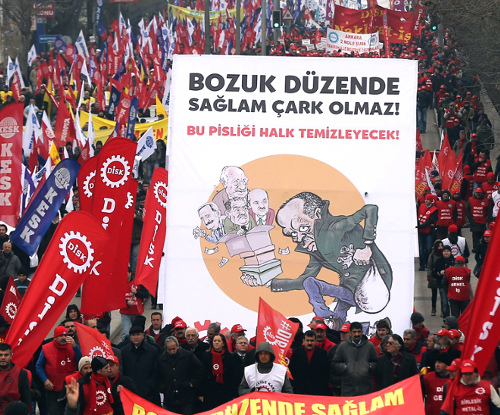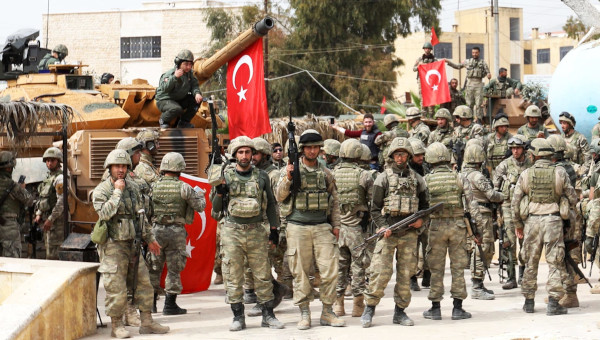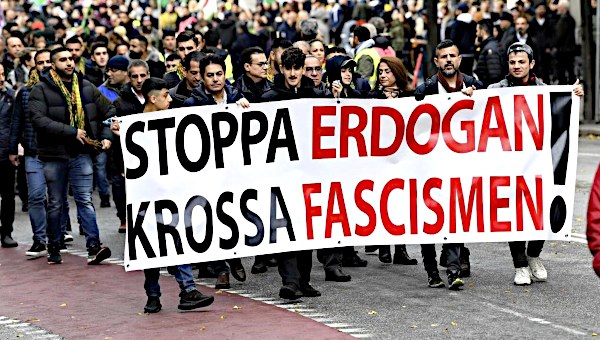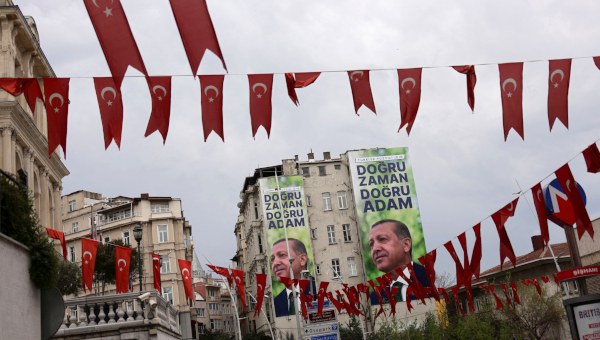An Analysis of the Presidential Election in Turkey
Recep Tayyip Erdoğan became the first publicly elected President of Turkey in the history of the Republic, winning 52 per cent of the votes at the presidential elections of August 10. Ekmeleddin Ihsanoğlu, joint candidate of the CHP (secularist, so-called centre-left) and the MHP (nationalist, centre-right), finished second with 38 per cent of the vote. Selahattin Demirtaş of HDP (pro-Kurdish, left) came in third with 9.6 per cent of the votes.

The August 10 elections illustrated well the conundrum of Turkish politics and the success of Erdoğan’s AKP in shifting the centre of Turkish politics to the right. An evident outcome of this election was Erdoğan’s clear win in the first round, which rendered him the first President elected by popular vote, a fact upon which he is likely to base the (il)legitimacy of his actions as President. A shift in the centre of politics to the right, however, has been a subtle and systematic change that not only played into Erdoğan’s hands but also left many voters with the frustration of not being represented by the opposition parties.
Erdoğan’s success in winning the heartlands of Turkey, and thereby the election, is a disappointment that many secularist and leftist Turks sadly have become accustomed to over the years. Another disappointment, which they have seen time and time again, is the weak-willed policies of the main opposition party. The Republican People’s Party (CHP), officially a social-democratic party, has long ceased to have any connection with the left in order to compete with AKP’s rightist and Islamist policies. It lost its breath in chasing AKP’s shadow with a view to mirror AKP’s success. Its decision to support Ihsanoğlu, a theologian and former Secretary General of the Organization of Islamic Cooperation, is just another illustration of this stillborn strategy.
Non-Partisan Custodian?
Turkey is a parliamentary republic whose President is traditionally expected to act as a non-partisan custodian of the rule of law, which in part explains the lengths to which the main opposition candidate went to present himself as ideologically neutral. Nevertheless, Ihsanoğlu’s conservative tenor became apparent in some of the less scripted comments he made during his campaign. Ihsanoğlu went out of his way to insist that he “represent[ed] the mentality and preferences” of AKP voters, and that founding members of the party who had become disillusioned with Erdoğan supported him.1 He also called for Turkey’s LGBT community, whose cause is just beginning to enter the mainstream of secularist opposition politics, to respect Turkey’s status as a “conservative society” and behave accordingly.2
Ihsanoğlu, who is new to Turkish politics, did not offer an alternative to Erdoğan, either in class politics or with regard to emancipatory social stances. His campaign focused instead on democratic procedure and on modest limitations to the role of the state in citizens’ lives. He proposed to conserve the existing power structures and curtail the excesses of Erdoğanian democracy, namely the reign of authoritarian and populist politics pursued by Erdoğan’s AKP government. Ihsanoğlu’s vision of democracy included some elements of secularism and a stronger enforcement of the separation between public and private spheres. Under an Ihsanoğlu presidency, the government’s activities would be restricted to the public realm and its interference in the private realm would not be tolerated. In other words, the state would not be a machinery of social engineering whose ultimate role is to regulate the private realm by interfering in peoples’ lifestyle or belief systems à la Erdoğan’s much touted “conservative democracy.” Additionally, in the face of both domestic and regional turmoil he promised peace and stability in his campaign. Ihsanoğlu’s stand, sanctioned by the CHP, is at best a form of classical liberal/conservative thought, without any traces of leftist thinking. Although his platform was more palatable compared to that of Erdoğan, he was not the alternative that anyone even minimally left of center in Turkey had been hoping for.
Capitalist in structure and moderately conservative in cultural matters, with a somewhat more circumspect state, Ihsanoğlu’s Turkey reflects the status quo of about 2010; not a rollback to pre-AKP days, even, but to the period before the AKP’s constitutional referendum victory handed it the power and momentum required for the full-scale state assaults on secular lifestyles and judicial independence that have taken place since then.
The Left
While Ihsanoğlu implicitly advocated a return to the “moderate Islamist” center-right profile of the AKP circa 2010, Demirtaş proposed taking steps toward a Turkey that has never yet been, either in the old days of secular nationalism or since. The HDP election campaign unfolded in the spirit of leftist thought. Demirtaş, a former human rights lawyer of Kurdish origins, had embraced the role of fighting for the Kurdish cause in his previous political career. For the Presidential elections, however, he introduced himself as a candidate of ‘the peoples and change’, a candidate to represent not only the Kurds but also other groups living in Turkey, with a vision that extends beyond a mere pro-Kurdish stand. He called for ‘radical democracy’, a post-Marxist concept developed by Laclau and Mouffe, which he deems fit for the current conjuncture of Turkey. He underlined that traditional political parties had exploited the clash of different groups in Turkey, such as the nationalists, leftists, secularists, Kemalists, Islamists, or people with different ethnic identities, by using one or several of them as their power basis and antagonizing the rest. (The AKP government has been, par excellence, a keen implementer of this wretched policy). Demirtaş suggested that the solution to the current political crisis should not be built on the dominance of any of these groups at the expense of the others. This would only increase social tensions and lead to further grievances. Demirtaş’s radical democracy would embrace the difference between these groups and the people at the margins without imposing a uniform identity upon them. This strategy would yield the possibility of coexistence in harmony under the guidance of the principles of human rights and a robust notion of positive freedom. His campaign embraced advocacy for women, workers, and the environment, and even for gay and lesbian rights, and these strong stances distinguished him from both of the other candidates.
Indeed, Demirtaş’s vision differs from Erdoğan’s not only in degree but in kind. Though the Turkish constitution envisions the President as non-partisan guardian of the Republic and its laws, Erdoğan made it clear that he would not be a neutral President, but would be on the side of ‘his people’, by which he means his AKP voting base. Erdoğan has also promised to make use of the presidential power to dissolve the parliamentary government, a power granted by the current constitution with an eye to states of emergency, but not relied on in practice since the presidency of Kenan Evren, who came to power in 1980 via military coup.
Demirtaş’ program came as a refreshing solution to the traditional dilemmas in Turkish politics and was indeed admired by a considerable number of people in Turkey, although one cannot really say that this was fully reflected at the ballot box. In the run-up to the elections and its immediate aftermath, I held discussions with people from different walks of life who said they would vote or had voted for either Ihsanoğlu or Erdoğan. When I asked their view of Demirtaş, the answer remained the same, which could be summarized as follows: “I quite like Demirtaş’ ideas and approach… only if he had not openly or tacitly supported the PKK,” or “if only his party would not stand up solely for the Kurdish cause.”
One could draw two conclusions from this picture. First, active involvement in the Kurdish cause is still perceived as a taboo, which prevents the non-Kurdish audience from fully trusting politicians who have a history with this cause. Second, the number of leftist sympathizers is substantial. This can be deduced from the unexpected popularity of Demirtaş in the eyes of people who do not normally associate themselves with the Kurdish cause, including even many who did not end up voting for him. This observation exposes a desperate desire to shift the centre of Turkish politics to the left. Any party that seeks to be a viable opponent to Erdoğan has to realize this quest first.
Or Else? En Route to the New Turkey
Erdoğan did not leave the consequences of this extremely skewed political system to our imagination. The aftermath of the elections read like a thriller. He first purged his long-time ally Abdullah Gül, former President and co-founder of AKP, signalling him as a threat. With his blessings, Ahmet Davutoğlu, former Minister of Foreign Affairs and a keen supporter of pan-islamist ideology, was elected with an overwhelming vote at the extraordinary AKP congress on 27 August.
In their respective speeches both Erdoğan and Davutoğlu pledged for cooperation and shared their vision of New Turkey (Yeni Türkiye) with the public. Newly elected President Erdoğan expressed his intention of not cutting the organic ties with his party, which he calls as ‘his fifth child.’ Let alone pretending to assume a more neutral position as his new title would require, Erdoğan acted as the de facto leader of the party and talked about his party’s mission (dava), which he would now continue as the President. However, as Erdoğan himself underlined, it is just a beginning and the shape of things to come in his New Turkey will be somewhat different.
Davutoğlu and Erdoğan seem to be in tune when it comes to their power sharing agreement, which is likely to lead further concentration of power and render an already imperilled system of checks and balances even more illusionary. Former President Gül often acted as a notary and signed every AKP proposal without much resistance, yet in Erdoğan’s New Turkey the tides will turn and the presidential power will expand. This agreement will pave the way for maintaining Erdoğan’s dominance in Turkish politics, which Erdoğan hopes to seal by establishing an executive presidential system.
There was also familiarity hidden in their vision of the New Turkey. First and foremost, it was served with their traditional divisive political discourse with classical bashing sessions particularly devoted to the secularists (the old defeated enemy) and Fethulah Gülen (yesterday’s loyal ally and today’s fierce enemy). Both Erdoğan and Davutoğlu expressed their determination to fight ‘the parallel state’ of the Gülen movement. As it stands now, the New Turkey appears to be yet another manifestation of divisive Erdoğanian democracy, which is in constant need of an enemy figure as the driving force of its power. The discourse of enemies and the tension it generates has served Erdoğan well in controlling the public and concentrating further power in his hands. This pathological tendency, however, continues to damage the social fabric, creating new animosities and rekindling old ones.
The New Turkey has already turned out to be another dead end. Though Demirtaş’s HDP campaign was a good start, it will take a more unified opposition to turn left and find a new route. •
This article first published on the LeftEast website.





